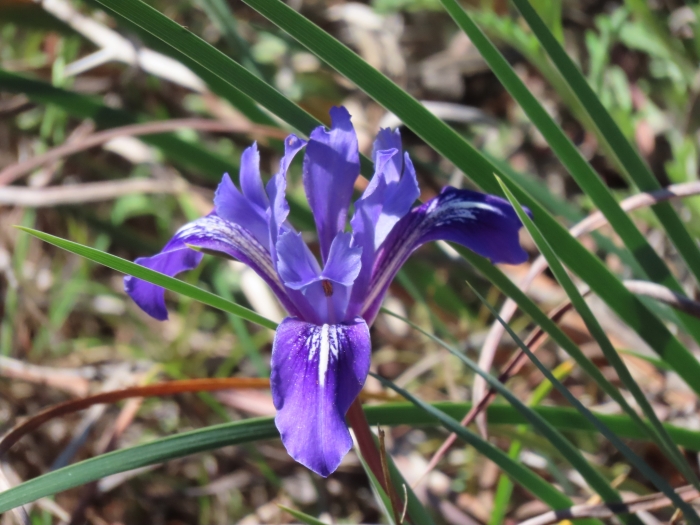Bowltube Iris
(Iris macrosiphon)
Bowltube Iris (Iris macrosiphon)
/
/

icosahedron
CC BY 4.0
Image By:
icosahedron
Recorded By:
Copyright:
CC BY 4.0
Copyright Notice:
Photo by: icosahedron | License Type: CC BY 4.0 | License URL: http://creativecommons.org/licenses/by/4.0/ | Rights Holder: icosahedron | Publisher: iNaturalist | Date Created: 2020-04-21T12:04:29-07:00 |







































Estimated Native Range
Summary
Iris macrosiphon, commonly known as Bowltube Iris, is a deciduous perennial herb native to the grasslands and open woodlands of California, particularly in the North Coast Ranges, and the Cascade Range Foothills. It is a member of the iris family and is appreciated for its distinctive flowers. The Bowltube Iris typically grows to a height of 15-60 cm. Its flowers are variable in color, ranging from golden yellow to cream, or pale lavender to deep blue-purple, often with darker veins, adding to their ornamental appeal. The flower stems are usually short, less than 25 cm, especially when exposed to full sun, and each stem bears 1-2 flowers. The blooming period occurs in spring, and the flowers are moderately showy. The leaves are very slender, 2.5–5 mm wide, and blue-green in color, forming attractive clumps.
The Bowltube Iris is valued for its drought tolerance and ability to thrive with minimal care once established, making it suitable for xeriscaping and naturalistic plantings. It is often used in rock gardens, native plant gardens, and as a border plant. This species requires well-drained soils and is adapted to a Mediterranean climate with dry summers; it prefers full sun but can tolerate light shade. While it needs moderate water during the growing season, it benefits from dry summer dormancy. Gardeners should be aware that excessive moisture, particularly in winter, can lead to bulb rot.CC BY-SA 4.0
The Bowltube Iris is valued for its drought tolerance and ability to thrive with minimal care once established, making it suitable for xeriscaping and naturalistic plantings. It is often used in rock gardens, native plant gardens, and as a border plant. This species requires well-drained soils and is adapted to a Mediterranean climate with dry summers; it prefers full sun but can tolerate light shade. While it needs moderate water during the growing season, it benefits from dry summer dormancy. Gardeners should be aware that excessive moisture, particularly in winter, can lead to bulb rot.CC BY-SA 4.0
Plant Description
- Plant Type: Herb
- Height: 1-2 feet
- Width: 1-1.5 feet
- Growth Rate: Moderate
- Flower Color: Blue, Purple, White
- Flowering Season: Spring
- Leaf Retention: Evergreen
Growth Requirements
- Sun: Full Sun
- Water: Medium
- Drainage: Slow, Medium
Common Uses
Bee Garden, Bird Garden, Butterfly Garden, Deer Resistant, Hummingbird Garden, Low Maintenance, Rabbit Resistant, Showy Flowers
Natural Habitat
Native to the grasslands and open woodlands of California, particularly in the North Coast Ranges, and the Cascade Range Foothills
Other Names
Common Names: Ground Iris
Scientific Names: , Iris macrosiphon, Iris californica, Iris amabilis, Iris macrosiphon var. elata, Iris californica publ, Iris elata, Limniris macrosiphon,
GBIF Accepted Name: Iris macrosiphon Torr.